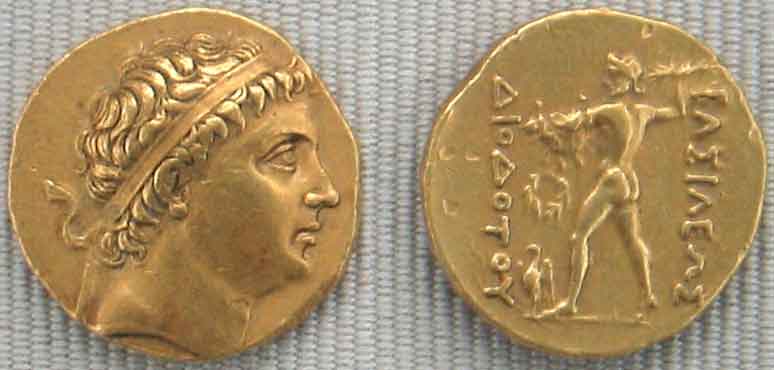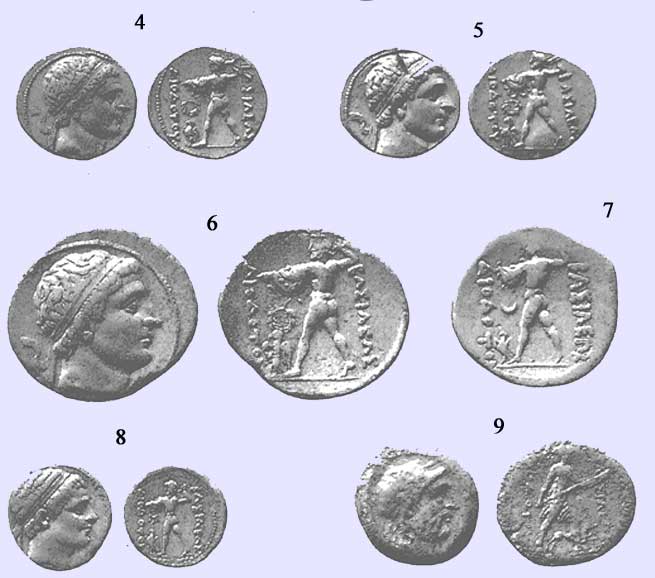|
|
Diodotus, Seleucid satrap of Bactria, rebelled against Antiochus II (about 255 BC) and became the founder of the Graeco-Bactrian kingdom (Trogus, Prol. 41; Justin xli. 4, 5, where he is wrongly called Theodotus; Strabo xi. 515). His power seems to have extended over the neighbouring provinces. Diodotus was a contemporary, a neighbour, and probably an ally of Andragoras, the satrap of Parthia, who at about the same time also proclaimed independence from the Seleucid Empire.
Independence and prosperity Diodotus wrestled independence for his territory from the Seleucid ruler Antiochus II, who was embroiled in a war against Ptolemaic Egypt: Diodotus, the governor of the thousand cities of Bactria (Latin: "Theodotus, mille urbium Bactrianarum praefectus"), defected and proclaimed himself king; all the other people of the Orient followed his example and seceded from the Macedonians. (Justin, XLI,4 [1]) The new kingdom, highly urbanized and considered as one of the richest of the Orient (opulentissimum illud mille urbium Bactrianum imperium "The extremely prosperous empire of the thousand cities of Bactria" Justin, XLI,1 [2]), was to further grow in power and engage into territorial expansion to the east and the west: "The Greeks who caused Bactria to revolt grew so powerful on account of the fertility of the country that they became masters, not only of Ariana, but also of India, as Apollodorus of Artemita says: and more tribes were subdued by them than by Alexander... Their cities were Bactra (also called Zariaspa, through which flows a river bearing the same name and emptying into the Oxus), and Darapsa, and several others. Among these was Eucratidia, which was named after its ruler." (Strabo, XI.XI.I [3]) Conflict with Arsaces Arsaces, the chieftain of the nomadic (Dahan) tribe of the Parni, fled before him into Parthia and there eliminated Andragoras, the former satrap and self-proclaimed king of Parthia, and became the founder of the Parthian Empire (Strabo l.c.). The Greco-Bactrians became cut from direct contacts with the Greek world. Overland trade continued at a reduced rate, while sea trade between Greek Egypt and Bactria developed. When Seleucus II in 239 BC attempted to subjugate the rebels in the east, it appears he and Diodotus united together against the Parthians (Justin xli. 4, 9). Soon afterwards Diodotus died and was succeeded by his son Diodotus II, who concluded a peace with the Parthians (Justin l.c.). Diodotus was succeeded by his son Diodotus II, who allied himself with the Parthian Arsaces in his fight against Seleucus II: "Soon after, relieved by the death of Diodotus, Arsaces made peace and concluded an alliance with his son, also by the name of Diodotus; some time later he fought against Seleucos who came to punish the rebels, and he prevailed: the Parthians celebrated this day as the one that marked the beginning of their freedom" (Justin, XLI,4 [4]) Diodotus II was subsequently killed by a usurper, Euthydemus, founder of the Greco-Bactrian Euthydemid dynasty (Polyb. xi. 34, 2). Coinage Of Diodotus I we possess gold and silver coins, which imitate the coins of Antiochus II; on these he sometimes calls himself Soter, "the saviour." As the power of the Seleucids was weak and continually attacked by Ptolemy II, the eastern provinces and their Greek cities were exposed to the invasion of the nomadic barbarians and threatened with destruction (Polyb. xi. 34, 5); thus the erection of an independent kingdom may have been a necessity and indeed an advantage to the Greeks, and this epithet well deserved. Diodotus Soter appears also on coins struck in his memory by the later Graeco-Bactrian kings Agathocles and Antimachus. Cf. AV Sallet, Die Nachfolger Alexanders d. Gr. in Baktrien und Indien; Percy Gardner, Catal. of the Coins of the Greek and Scythian Kings of Bactria and India (Brit. Mus.). Of Diodotus I we possess gold and silver coins, which imitate the coins of Antiochus II; on these he sometimes calls himself Soter, "the saviour." As the power of the Seleucids was weak and continually attacked by Ptolemy II, the eastern provinces and their Greek cities were exposed to the invasion of the nomadic barbarians and threatened with destruction (Polyb. xi. 34, 5); thus the erection of an independent kingdom may have been a necessity and indeed an advantage to the Greeks, and this epithet well deserved. Diodotus Soter appears also on coins struck in his memory by the later Graeco-Bactrian kings Agathocles and Antimachus
(Seleucid Empire) Greco-Bactrian Ruler
This entry was originally from the 1911 Encyclopedia Britannica. Retrieved from "http://en.wikipedia.org"
 |
|
|||||||||||||||

